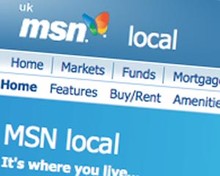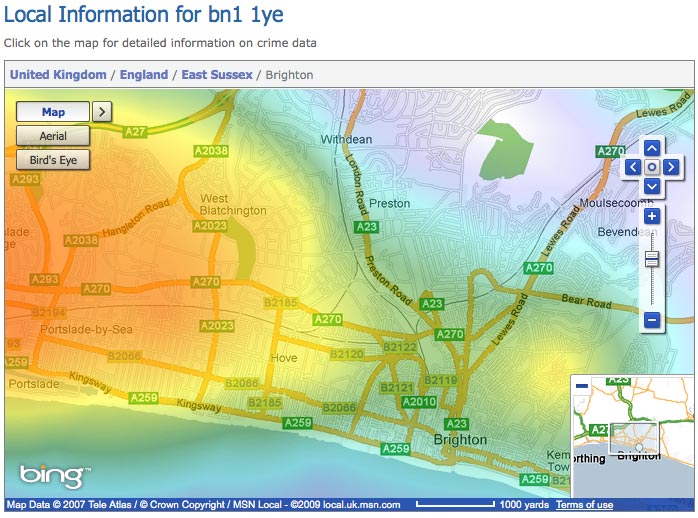
Several of these initiatives focus on user-generated content, recruiting 'citizen correspondents' and aggregating news from local newspaper sites by postcode.
But coming at the trend from a different angle are sites like Everyblock, recently acquired by MSNBC, and MSN Local.
Launched in June, the MSN UK channel is focusing on data to build a hyperlocal, postcode-based news and information service.
"The strapline is 'It's where you live' and that's really the aim of this project - to bring together information from your neighbourhood to help you get the most out of it," Alastair Bruce, content manager for MSN Local, tells Journalism.co.uk.
"It initially focused on property because that's a big part of where you live. Buying a house or flat is usually most people's biggest single investment.
"[MSN] Local is still partly focused on property but we've moved away from it being purely buying and selling."
As such, the site now provides property, school, gym and transport location searches, as well as data for areas on crime rates, flood risks and trends in property prices. Results are mapped and data visualised using heatmaps, as shown below:

On top of this MSN made a donation to the Wikipedia Foundation so that Wikipedia information about local areas can be displayed on the maps.
Making the most of data
Data firm Shoothill is the main supplier of the information behind the site and provides the heat map technology. It also developed the recent MPs' expenses map created by MSN News UK.
"We are not standing still with this project. This isn't the finished version. I've got a huge list of data sources that I'm busy trying to cost out at the moment," says Bruce, explaining that the company needs to pay to access some data sets.
"There's quite a lot of data available, but there's a difference between the data being available and that data being available to use."
Now the site is attracting 300,000 users a month, according to internal figures, and an estimated 5-6 searches per person.
The most popular pages are the heat map visualisations and property, which shows users are not just coming to it for listings information, says Bruce.
During the development of MSN Local, user feedback suggested schools data was particularly in demand.
Next on the hitlist are heat maps built with flood risk data. Bruce says his team has not ruled out using data sets from news and listings to event information - anything that fits with the strapline.
Bringing in users and advertisers
Northcliffe's recently launched Local People network of hyperlocal sites are a combination of user reviews and local business advertising - is this in the pipeline for MSN Local?
"Bringing users in is something we're considering. We've asked for user feedback so far," says Bruce.
"User reviews and what other people think of the area as is a valuable part of local information - it's one of the data sets that we're looking at. It's a question of whether we partner or do it ourselves."
The site already has a partner in Propertyfinder and tie-ups with commercial partners elsewhere on the MSN UK portal could be extended to the local offering.
"Data helps people make informed choices (…) PropertyFinder and estate agents should view sites like this as a help because potential viewers can get a better idea of what they want," says Bruce.
"Ultimately the site is there for consumers first and foremost and if the consumer finds benefit out of it then the partners will too.
"Purchase transactions start with a local search. We're definitely looking at how we can integrate those within this product.
"Local commercial intent searches are what Google, Microsoft and Yahoo are trying to perfect. But then there's this other strand: interesting information pulling you in. Ultimately this product is looking to combine the two."
Local media
Bring in more local news and listings could put MSN Local in competition with existing outlets, in particular local newspaper websites.
But in a recent interview, MSN UK executive producer Peter Bale told the Telegraph the site was considering using RSS feeds from local newspaper's potentially in return for payment or a traffic sharing arrangement.
Partnerships with local news organisations have not been ruled out, but no specifics are in place, explains Bruce, it's just one route the team is considering.
"We haven't made any definite decisions yet - different companies have different strengths and local newspapers have been providing local news for years and years. We would be new in that field," he says.
"We haven't made any decisions but partnerships wouldn't be ruled out and are a definite possibilities."
Microsoft's strengths lie in search and software – MSN Local makes use of the APIs from its products, Bing and Multimap, for directions, search and mapping, for example.
Speaking to Journalism.co.uk in a week where a national news organisation, the Washington Post shuttered its hyperlocal experiment, the LoudonExtra, Bruce is no less convinced that a national website can do local level coverage. MSN's offering will play to the company's strengths and make strategic partnerships, such as that with Shoothill, in more unfamiliar areas, he says.
"A tech company could work with local newspaper or any other local data information provider. We have experience in some areas and they have expertise in others," he says.
MSN Local may have stolen a march on UK newspaper websites in terms of data visualisation and local information searches because of the company's 'expertise'. But Bruce expects local newspapers will soon start experimenting more with the way local information is presented.
"[T]echnology providers like Microsoft are pretty well situated to already do this. I can't speak on local newspapers' behalf, but I imagine it's quite difficult for them because they have an established business model around local and conducting experiments with your established business model is obviously quite risky, but when your business model is the way it is now maybe you should," he says.
Using the data for news
The site itself is planning to use MSN Local to generate more content for its other channels. Stories illustrating how the data can be used or pieces complemented by maps and data from the site have already been run, but this will be developed further, says Bruce.
"We've started extracting some of the information and we will often use it to complement stories. We haven't done a great deal of using this information for starting news stories, but that's definitely something we want to do," he adds.
A few changes to the site are necessary before this can happen - improving search, the next level of investment in the project - and new appropriations of the data, such as a table of fastest growing areas, would make useful additions, he says.
Shoothill's mapping technology may also provide a source of new stories for other journalists, who could use the MSN site's data and visualisations to illustrate or spark new leads. The stark contrast between areas of high and low crime within a single postcode is instantly visible using the heat maps, for example, and a starting point for a reporter.
"There's a huge amount of data out there," says Bruce, who is ruling nothing out. "There are just so many other stories that you can tell about other people's areas."
Free daily newsletter
If you like our news and feature articles, you can sign up to receive our free daily (Mon-Fri) email newsletter (mobile friendly).
Related articles
- 40 essential newsletters every journalist should read
- Protecting independent journalism, with Lexie Kirkconnell-Kawana of IMPRESS
- Five key takeaways from the UK select committee on the future of news
- 15 free sources of data on the media industry
- The first UK local news publisher gains charitable status









